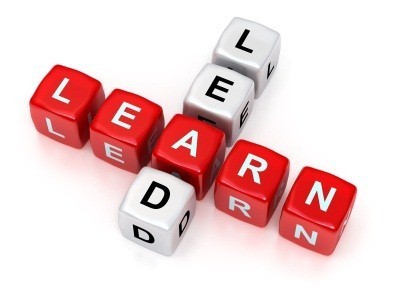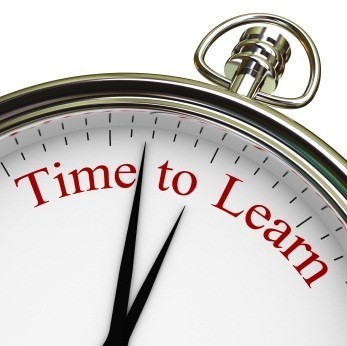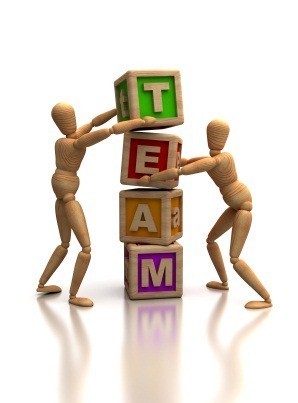Susan Scott's Blog, page 121
December 27, 2011
Leading from the Ground Up


Recently, a friend shared with me how awesome her boss is. She explained that she thought this was because her boss had slowly, over the years, worked her way up through the company, held several different positions, and understood on a very personal level how each job contributed to the organization.
The others all agreed that in their work history, bosses who knew what everyone did on either a personal level or because they had taken the time to learn, were some of the best leaders they'd had.
As a leader, should you know how each job functions within your company?
To me, the biggest benefit of a leader having this knowledge is having a keen awareness of who to invite to the table in the decision-making/idea creation process.
Our team model looks at an organization like a beach ball. Each employee represents a different perspective, or different color "stripe", on the giant beach ball that is the organization. We believe that no one person owns the capital T truth, and that often times, differing truths compete with one another. What is true for Accounting is different than what is true for Marketing.
A pitfall leaders can make is inviting the same people to the table. More than likely, the same answers will show up again and again.
But what if the leader knew the jobs of its employees well enough to think - the office manager has a unique perspective on how the company is run; perhaps he has an idea on how to cut wasteful spending?
Leaders who invest the time to learn more about the roles they oversee build an emotional connection with their employees. Their employees feel that investment, and your time honors the job they do.
It also gives the leader a more thorough understanding of how to put teams together and how to potentially reinvent roles.
Do you have leaders that know your job? If you are a leader, do you know your team's roles?
For more information about leadership development and training, visit our site (www.fierceinc.com).
December 22, 2011
Santa Conversations


The holidays are upon us! For those of you who celebrate Santa Claus and have children, the issue of Jolly Ole Saint Nick can be a precarious one.
The desire for your child to believe just one more year in Santa is real for many parents. Yet as each Christmas passes you can see the doubt swirling in their eyes as they piece the logistics of the puzzle together.
Is Santa real?
What do you say? How do you handle this delicate question? How can you be "fierce" with your kids, and not squash the holiday spirit?
Recently a colleague of mine, Aimee Windmiller-Wood, shared an amazing letter one mom,Martha Brockenbrough, wrote to her young daughter when she asked the question: I NEED TO KNOW, ARE YOU SANTA? TELL ME THE TRUTH.
Martha then articulates what Santa is all about so well, it re-adjusted my holiday outlook.
Here is small snippet of what she says:
I am not Santa. There is no one Santa… Santa is bigger than any person, and his work has gone on longer than any of us have lived. What he does is simple, but it is powerful… He teaches children how to have belief in something they can't see or touch…
Santa is a teacher, and I have been his student, and now you know the secret of how he gets down all those chimneys on Christmas Eve: he has help from all the people whose hearts he's filled with joy.
We strive to have authentic conversations with our children every day. No one wants to deliberately lie to their kids, and this mom shows us that it's not so black or white.
Is there a Santa? Not technically. But there is a spirit behind Santa that is real, a spirit that makes each December just a little brighter.
I encourage you to read the full article, on Cozi's website. It's a powerful example of how sometimes there's really not a simple yes or no answer.
Happy Holidays!
For more information about leadership development and training, visit our site (www.fierceinc.com).
December 20, 2011
What's your Story?


The holidays are rooted in the tradition of storytelling. From the legend of Old Saint Nick to the stories shared in a family of holidays past. This time of year reminds me that what binds us together is the tales we create with one another.
I am always amazed by a gifted story teller's ability to make some of the most mundane events seem life changing or at the very least interesting to listen to. I love stories – all kinds of stories. I especially love true stories – stories about someone's life and experiences.
My parents are getting older, and I am hungry for their stories. As I get older, I realize how important capturing the history of our family is. My dad's father left home and didn't return when he was a small boy.
It was the classic "I'm going out for a pack of smokes", and he never came back. Not only did this change my father forever, but it also took away a significant part of his history – of my history. Those stories are gone forever.
How has your life been different than what you'd imagined?
Who has been kindest to you in your life?
When in life have you felt most alone?
These are just a few of the questions that are posted by Story Corps on their website. I love the format they use – family members or friends interviewing someone they know. A simple conversation. I enjoy listening to Story Corps on NPR and I often sit in my driveway until a story is finished.
The holidays are the perfect time to pull out some of the old stories. Who do you want to know more about?
What's your story?
For more information about leadership development and training, visit our site (www.fierceinc.com).
December 15, 2011
What Do You Know That You Don't Speak Of?


"Mokita"- That which everyone knows and no one speaks of. The Papuans of New Guinea judge the health of any community by the number of "mokitas" that exist within it.
The more "mokitas", the less healthy.
If you did an honest survey of your organization today, how many Mokitas would you find?
More than that, what are they costing you?
I once worked in an organization that had a "Casual Friday" policy. The company never defined what "casual" meant, but it was assumed that jeans and a nice shirt were acceptable.
However, one employee thought it meant she could wear full pajamas and fuzzy pink bunny slippers. Granted she was in accounting and rarely saw outside clients, yet we all knew this is not what the executives had in mind.
No one said a thing.
Instead three months after she started, they terminated "Casual Friday". Just like that, poof…gone. People were disappointed. This was something the employees at that office really looked forward to. It was a symbol that we were almost to the weekend, a chance to let our hair down just a bit.
We all knew it was because of her. I was in HR at the time, and my boss flat out told me it was because of her.
No one said a thing.
Employee engagement within the organization shot down. People began to speak of circulating resumes; whispers of discontent ran through the halls. Obviously it wasn't the only Mokita we had, yet it was such an obvious one!
They changed a whole policy for one person, just to avoid having the conversation, and we all knew it.
That which everyone knows and no one speaks of is a silent killer of morale, engagement and loyalty within organizations. Examples of communication that cause employee disengagement can be found in an article posted yesterday on Ragan's HR Communication website. A culture that feels tied to silence and only dares to whisper does not go far.
So here's a suggestion: dare to have an Annual Mokita Amnesty day, where you name the Mokitas with no fear of repercussions. I know it sounds scary, maybe even impossible, but think what you could learn!
What would happen within your organization if you all committed to this?
For more information about leadership development and training, visit our site (www.fierceinc.com).
December 13, 2011
Telecommuting the Conversation


So, you are a telecommuter, you have people on your team who telecommute, you are a wannabe telecommuter…you get the point.
How do you make sure you aren't banished to the island of forgotten employees? How do you help an old school boss understand that you are working and not doing laundry and watching soap operas (do people even watch soap operas anymore)?
Some companies, like Plantronics are actually designing their work-spaces to try to keep employees working from home. They haven't even designed enough desks for all their employees.
"There's an expectation that you can work anywhere and be highly productive and engaged," says Patricia Wadors, Senior Vice President of Human Resources at Plantronics.
What Plantronics has come to realize is that conversations are changing. They can take place via Skype, text, email, phone and, of course, in person.
The secret to keeping the telecommuting conversations going, is to have them. And when you have them, be authentic and present.
Presence is not only about being physically present, but rather mentally and emotionally present. This is the key to being an engaged employee and not needing as much face time.
Things are changing. Kudos to the companies that are on the forefront of figuring this out. These companies are forging the path for the rest of them.
How do you stay engaged when you telecommute? What are your secrets or tips?
For more information about leadership development and training, visit our site (www.fierceinc.com).
December 9, 2011
Gainers and Drainers of Time Management


As the New Year approaches, I am taking this opportunity to examine my day- today time management habits and looking for things that either drain or gain my time.
Let's be honest- I'm not as efficient as I could be. I write multiple "To-Do" lists and tend to only use one. My filing system in Outlook is not as well kept as it could be, which leaves me constantly spending precious time searching for things.
The biggest time sucker is that sometimes I procrastinate. Rather than tackling my toughest challenge as soon as possible, I put it off until it has to get done- this usually leaves a mess behind that I then have to pick up the next day- wasting more time.
The trickle effect of all this is drained energy. My time is then not my own. Occasionally, I don't get to check off nearly as many things as I would want from my many "To-Do" lists.
Time management, like conversation, is a skill. It takes discipline and tools to help get organized, so your time becomes your own again.
Equally important is figuring out what you do need to get done, so once you have all that time you know what you need to accomplish.
In the Fierce Delegation model, there are tools to become aware of your gainers and drainers. Here are three great tips to move in the energy saving direction.
1. 5 Things to Do
It's good that I write "To-Do" lists. It's not good that I write so many. First things first: examine your current organizational system and make sure it works, and you'll actually use it.
Next, before you leave for the night, write down 5 things you will accomplish the next work day. It's 5 things, not 2 or 3 or 10. Don't leave the office until you've completed and checked off your 5 things. Then, before you go, write 5 more. This is a muscle - it takes practice to build strength.
2. Recruit a "5 things Buddy"
Just like when you hit the gym after a long sabbatical, having someone to help keep you on track is a huge helper. Perhaps you enlist another colleague who suffers in the time-management department and wants to become more disciplined, or a colleague where this is his or her strength. Learn from and bounce ideas off them. Early on, this buddy system might help you o stay on track.
3. Energy Drainer/Energy Gainer List
It's not always just about inefficiencies. Sometimes you are doing work that is no longer your job, or never was. In the Fierce Delegation Model, we take a hard look at what's on our plate and have Fierce Conversations with ourselves about what needs to stay and what needs to go.
You can begin to do this by writing a list of energy drainers and energy gainers. For the drainers: what can you eliminate within the next 30 days? For the gainers: which ones can you implement within the next 30 days? Awareness is the first step, and then action!
Good luck, and Happy Time Management!
For more information about leadership development and training, visit our site (www.fierceinc.com).
December 7, 2011
Global Conversations


I'm sitting in my hotel in Beijing after attending a client appreciation day for our new authorized provider in Greater China. It continues to amaze me, how if you dig just a little past our differences, we are so similar.
While here in China, I've met many wonderful people and chatted about things like the US Occupy Wall Street movement, the lottery scandal in Connecticut, the financial market swings in Asia, the Euro, and inflation in China. All while sharing pictures of children of course!
Miles away from where I call home, It was like I was talking with my neighbor over the back fence.
Our worlds are so interconnected. Information can travel so quickly and be accessed so easily that time and space no longer dictate what is relevant to each of us anymore.
From my hotel room in Beijing, I went from the wonderful experience of learning more about China, to virtually checking in with our prospective partners in Egypt.
Without missing a beat, my mind swiftly changed to recent struggles, a hope for peace and the outcomes for their current election.
I'm looking forward to reconnecting soon with our partner in South Africa. And I love the continuing dialog with our partners in Colombia, Poland, the UK, Canada, Australia, Lebanon and the US.
We share so many common dreams, missions…visions. And central to this is our desire to change the world, one conversation at a time. It is extremely rewarding to be part of an organization that is touching the world in such an important way.
For more information about leadership development and training, visit our site (www.fierceinc.com).
December 2, 2011
Parent and Teacher Conversations


Next week, we are attending the 2011 Learning Forward Conference in Anaheim, California. Fierce founder, Susan Scott, is doing a session which focuses on learning how to be more accountable within education.
The topic of Susan's session got me thinking about a relationship that doesn't get talked about as much: the parent and teacher relationship. The level of accountability needed is high.
We focus on the student and teacher having a solid working relationship, yet what about the parent and teacher?
It's a unique situation.
Your child spends most of his or her day at school. Day in and day out the teacher is informing a large portion of character, social learning, and other intangibles, which up until kindergarten may have solely been the parent's job.
This relationship fascinates me because it can be both magical and tenuous.
A huge responsibility is placed on both parties' shoulders. Educating and raising another human being is quite the task. Each year it starts over, and a new relationship needs to be formed.
We create and solidify this commitment through conversation. The idea behind how to do this is simple: The conversation is the relationship. At Fierce we look at it like an equation: C=R: Conversation=Relationship.
Executing it, however, can be difficult
It takes time and energy to fully invest in both. There may be resistance or a context around wanting that level of involvement. Yet to be successful at the equation you need a high level of commitment.
On the most basic level, the teacher needs to talk with the parent about what is happening in the student's life at home. For parents it's talking with the teacher about your child's life at school. This is not just when the student is in trouble, or when they've done something well.
For the student and schools success it's incumbent upon both parties to see that a fully realized commitment between parent and teacher is necessary.
As we face daunting education reform ahead remember that: if it's to be, it's up to me.
As the teacher and as the parent, you may not be able to control how the system works. However you can control how you interact within it.
November 30, 2011
Engaging in Conversations that Challenge You


My youngest son recently reminded me, yet again, the importance of conversation, and the places it can take you.
At the start of the school year, he did not initially make it on his high school varsity basketball team. Upset but determined, he took matters into his own hands. He emailed the coach to set up a conversation the next day to see what he could do to improve his game and skills.
After listening to what the coach had to say, he went back out for try-outs and made it onto the team. Making the team was huge, but even bigger was how great he felt about taking matters into his own hands and having the conversation.
This got me thinking: even if the situation may be different, the outlook should be the same for many of us. Engaging in conversation, rather than sitting on the bench, is the game changer.
We can come to points in our lives where we aren't satisfied with the status or outgrow our current situation. It's conversations like the one my son had with his coach that move us to the next level.
Being open to hear others' opinions and ideas is integral in creating innovation, prosperity and excellence. Those robust conversations are what land you on the varsity team, or project you've coveted, or job promotion you've been working toward.
It's not easy to do. Plain and simple.
It requires not just courage but accountability. It's the kind of accountability that starts with taking proactive steps to learn what is holding you back.
Whether you are a 14 year old high school student or the principal of a large school district, it is never easy to dig deeper and question the unknown. However, regardless of the uncharted territory, this is inherently how we grow for our teams, our families, and ourselves.
Next week at the Learning Forward Conference in Anaheim, Susan Scott will be discussing how to engage in this type of conversation. I look forward to this session, and if you are going, I hope you can join us and begin!
For more information about leadership development and training, visit our site (www.fierceinc.com).
November 23, 2011
A Thanksgiving Conversation


Every year at Thanksgiving dinner, my family starts a conversation with the same question. We go around the table and ask: what are you most thankful for?
Everyone is expected to participate and contribute. There is no "pass" to answering the question.
As a young girl in my booster seat, my answers usually involved extreme gratitude for my Barbies, the cranberry sauce, my cat – naturally, all of things that made my world so sweet and fun.
As the years went by, my answers shifted to being thankful for living in the same city as my family, for creating silly memories together, and for sustaining the traditions we have. The answers change over the years…because I do.
Despite these changes, Thanksgiving is greeted with the same, warm question. It would not be Thanksgiving without it. When we have guests, I revel in including them in this exchange of thoughts. What are they most thankful for?
With Thanksgiving arriving tomorrow, I am reflecting on the significance of asking our sacred six word question. This beautiful ritual my family and I cherish is, in actuality, a very simple conversation.
This conversation allows us to check-in with ourselves and one another. It is a way to share how we've grown or changed and how our gratitude has shifted accordingly – from Barbies to creating memories. This conversation connects us.
What question can you ask to connect this year?
Perhaps: what are you most thankful for?
Susan Scott's Blog
- Susan Scott's profile
- 859 followers



